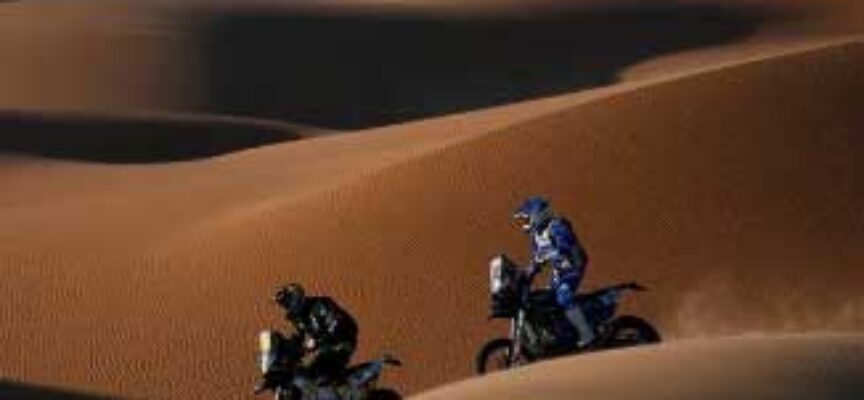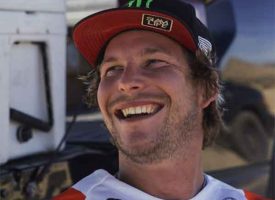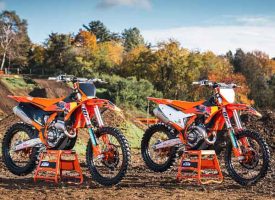Lifted this from NBCSports.com:
Former Supercross star Andrew Short scales ‘the Everest of dirt bikes’ at Dakar Rally
By Nate RyanDec 30, 2020, 7:00 AM EST FRANCK FIFE/AFP via Getty Images
FRANCK FIFE/AFP via Getty Images
Less than two weeks ahead of the world’s most grueling and prestigious cross-country motor race, navigating the Dakar Rally already was a major challenge for Andrew Short.
Because of the new strain of COVID-19, Saudi Arabia closed its borders to commercial air travel, and reaching the host nation of the world’s largest rally suddenly was a scramble.
In a Dec. 21 interview, hours after learning the news, Short calmly ran through the contingency plans for traveling to Jeddah, Saudi Arabia, from Europe on flights chartered by race promoter ASO.
“It’s been a crazy year,” Short said with a laugh. “It’s just a weird surprise to wake up to, but that’s how it is nowadays.”
That unpredictability also underscores the appeal of the Dakar Rally, which will begin Jan. 3, 2021 (with daily coverage on NBCSN and Motorsports Talk).
Deciphering thorny terrain and adapting to obstacles on the fly are why Short reinvented himself as an off-road rally rider after a starring turn for several years in Supercross and motocross.
“There are so many things it takes in rally to be successful, and between navigation and speed and fitness and the long days and durability of your bike, these are things that in a typical dirt bike race you never encounter,” Short told NBC Sports. “So I love the strategy. It’s not just about pure speed from the green flag to the checkered flag. With rally, it can flip-flop each day, and you’ve got to be really smart and assess the situation as it’s going on. You never give up because you never know what can happen on a race that’s this long.https://platform.twitter.com/embed/index.html?creatorScreenName=MotorsportsNBC&dnt=true&embedId=twitter-widget-0&frame=false&hideCard=false&hideThread=false&id=1344282848161918977&lang=en&origin=https%3A%2F%2Fmotorsports.nbcsports.com%2F2020%2F12%2F30%2Fandrew-short-dakar-rally-jimmy-lewis-yamaha-supercross-motocross%2F&siteScreenName=MotorsportsNBC&theme=light&widgetsVersion=ed20a2b%3A1601588405575&width=500px
“This is the spirit of rally and why I’m so attracted to it. It’s so different.”
But yet Dakar, which also has multiple classes for cars, trucks and buggies, also still represents the essence of motorcycle racing, his lifelong pursuit.
Short, who turned 38 last month, scored nine victories and more than 50 podium finishes in a two-decade career at the highest levels of dirt bike racing. “Motocross” still is listed as a primary hobby in his bio on the Yamaha Racing site.
“I love dirt bikes, and I love riding, and Dakar is like the Everest of dirt bikes,” he said. “It’s a true sense of adventure. It’s a life experience that most people don’t get to have, so that’s why I really wanted to go, and then once you go once, you’re addicted, and you just want to keep going.”

This will be the fourth Dakar Rally start for Short, who seems to have hit a sweet spot by shifting gears in middle age since his 2016 retirement from dirt bike racing (which was followed by nearly a year off).
After a 17th in his 2018 Dakar debut (finishing despite a fractured ankle in only his third attempt at a major rally), he quickly blossomed into a contender. An impressive sixth in his second Dakar presaged a breakthrough 2019 campaign in which he ranked second in the FIM Cross-Country Rallies world championship with a second in the Silk Way Rally and his first victory in the Morocco Rally.
He entered Dakar in 2020 with his best opportunity to win but finished 10th amid a rash of crashes and mechanical problems.
“Maybe I was too confident or just trying to force it,” Short said. “So this year, I want to have a different mindset and understand it’s a long race. It looks like Week 2 is going to be really important where Week 1 was important last year, but now the route is more or less reversed. I just want to stay in the race the first week so I can give myself the opportunity to fight for it and be smart.
“This is a race you have to know when to push, and when to pull back, and that’s a hard thing to fully grasp.”
While Short still is testing the limits while riding across dunes for several hours at a time over the course of 12 days, he has honed a knack for knowing how to get there. Navigation and strategy are critical to excelling at Dakar, and they have become more important since last year with officials now distributing daily road maps just before the start of each stage.
“All the races are going this direction, and this is a good thing for me,” Short said. “Because I don’t necessarily have the speed of some of the top guys, but if I can make less navigation mistakes, it puts me back in the game. So I really like this change.”
Short has trained over the past year with defending Dakar Rally champion Ricky Brabec at Jimmy Lewis Off-Road Training in the Nevada desert, which has a similar topography to the Dakar Rally.
Lewis, an off-road cycling veteran who placed third at Dakar in 2000, told NBC Sports that if the 2021 race centers on navigation, “then Andrew is going to be very, very strong. If they make the navigation really tricky, it’ll be no problem to see guys tossing away 20, 30, 40 minutes, whether getting really lost or with penalties from missing way points. At that point, Andrew is really strong. He understands it. Sometimes he overthinks the navigation a little bit. But if it gets really difficult, he’s put in the work to be really good.”
Lewis also believes Short will benefit in switching from KTM/Husqvarna to becoming one of Yamaha’s five riders.
Though the pandemic limited Short to working with his new team only once (in the Andalucia Rally in Spain, an October warmup for Dakar), he likes that Yamaha’s “very European and French-based mindset” meshes well with Dakar (which has a French-based organization).
He also likes his new bike, which he describes as “more motocross-based” in its construction with a lower center of gravity designed for the massive fuel supply needed to traverse stages with durations of more than 800 kilometers (the 12-stage rally covers about 3,000 miles).
“The way they configured the tanks, the engine design is almost reverse with where the intake is, it allows you to put fuel in a good spot,” said Short, a longtime Honda rider in Supercross. “This is more balanced for me and something I’ve really enjoyed, and I think it’s helped me feel more comfortable sooner and easier than I expected switching to Yamaha and a brand I’d never ridden before in my career.
“So far it’s been pretty good. Andalucia was great to race but was more based on just roads with a little bit of a navigation. When we get to Saudi for Dakar, it’s going to be the real deal. I think the bike will shine there.”
Lewis hopes Short’s move to Yamaha will bring “a little bit more attention from the team. On the Husqy team, I think it was sort of like, ‘We’re going to get this motocross guy who is going to get a lot of exposure,’ and they just expected him to be ridiculously fast. And it was like, ‘Hey, the guy is smart. He’s learning how to do it. He doesn’t want to be a crasher.’
Lewis said Short has proven to have “the bike handling skills and control to ride as fast as anybody,” but success often is about setting a pace in unknown and often dangerous territory (two riders died from crashes last year).
“You hear the saying, ‘You value your life too much,’ which is crazy, but when you’re around a group like that that’s not valuing their life that much and going that fast, it’s hard to decide what is the safe speed limit,” Lewis said. “It’s a tricky thing. You’re asking somebody who wants to be at the top to compete like this, and I think Andrew, to this day, isn’t really sure where the limit is. He’s pushing to find it, and he definitely knows that he can go too fast. And that’s a good thing. So it’s where is this happy medium of being able to go safely but still not lose time.”
Short said he is “not really willing to take the chances of Toby Price,” a two-time Dakar winner in 2016 and ’19 known for fearless aggression at more than 100 mph.
But Short believes there is an advantage to the mastery of “reading the desert” and understanding how to spot hazards based on where the surface is cross-grained.
“If you’re going at high speeds and don’t know this is coming, you don’t have time to slow down for it,” he said. “There’s a lot of terrain reading at speeds that you have to learn if you want to compete at the highest level. If you don’t ride the desert all the time, these are things you can’t see.”
That’s where the preparation can matter so much. Brabec grew up in the High Desert area of Southern California and took to the Saudi Arabian sand naturally last year in becoming the first American winner at Dakar.
Lewis said terrain reading can take “10 to 20 years of experience before you can start getting comfortable with it.
“It’s like having a spidey sense or ESP,” Lewis said. “It’s different everywhere. When I started racing rallies around the world, it was all new, and I couldn’t believe how fast these guys would go.”
The competitive rally culture has taken root with Short, who lives with his wife and two children on a farm in Smithville, Texas, outside of Austin (where he left on Christmas to travel to Saudi Arabia).
After years of 20- to 30-minute dirt bike races in which the object was “just to finish quicker than anyone else, and you’ll just smash people off the starting gate to get there,” he loves the camaraderie that is built over two weeks at Dakar, where competitors help each other after crashes and then crash beside each other nightly in the bivouac while swapping stories and sharing meals together.
“It’s a wild sport, and there are so many cool people that love racing and have big passion and make it really cool to be a part of that tribe,” Short said.
“This is what makes the attraction so addicting to me. There are so many different elements you have to be good at, and I love trying to balance it all out and conquer it.”






